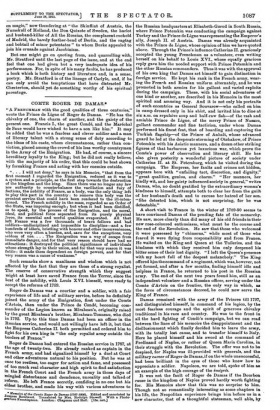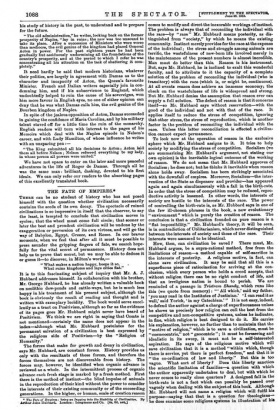COMTE ROGER DE DAMAS.* "A FRENCHMAN with the good qualities
of three centuries," wrote the Prince de Ligne of Roger de Dames. "He has the chivalry of one, the charm of another, and the gaiety of the
present one. Francis I., the great Conde, and the Marechal de Saxe would have wished to have a son like him." It may be added that be was a fearless and clever soldier and a man
of literary talent with a strong sense of duty according to the ideas of his caste, whom circumstances, rather than con- viction, placed among the crowd of his less worthy countrymen in the Army of the Emigration. He had, of course, a sincere hereditary loyalty to the King; but he did not really believe, with the majority of his order, that this could be best shown by forsaking France and acting with her enemies outside.
" . . . I will not deny," he says in his Memoirs, "that from the first moment I regarded the Emigration, reduced as it was to a system and a principle, as the first step towards the destruction of the kingdom and the king. Since there was no longer any law nor authority to counterbalance the vacillation and fury of factions, the nobility of France, as a body, was the only thing left to play this part in the country : to remove this body was the greatest service that could have been rendered to the ill-inten- tioned. The French nobility in the mass, regarded as an Order of the State, was imposing enough ; but when it had been distilled, so to speak, by the process of the Emigration, and its moral, ideal, and political force separated from its purely physical force, its essential and useful qualities evaporated. All that left France was a few thousands of brave fellows and bad soldiers--undisciplined and impossible to discipline—and a few hundreds of idlers, bristling with honour and other inconveniences, who were very often a burden, and, save for the exceptions, very seldom of use. . . . The Emigration was a way of escape from immediate danger, and for that very reason should have had no attractions : it destroyed the political significance of individuals whose strength lay in their union, and for that very reason it was futile : it made them dependent on foreign powers, and for that very reason was a cause of weakness."
Such remarks show a manliness and wisdom which is not affected by the fact that they are those of a strong royalist. The reserve of conservative strength which they suggest might at least have saved France from the Terror, since the best of the nobility, with Louis XVI. himself, were ready to accept the reforms of 1789.
Roger de Damas was a courtier and a soldier, with a fair
experience of life and of military service, before he definitely joined the army of the Emigration, first under the Comte d'Artois, then under the Prince de Conde, becoming com- mander of the Legion known as Mirabeau's, originally raised by the great Mirabeau's brother, Mirabeau-Tonneau, who died in 1792. Up to this time Dames had been an officer in the Russian service, and would not willingly have left it, but that the Empress Catherine II. both permitted and ordered him to fight for his own king in "the only royalist army outside the borders of France."
Roger de Damns had entered the Russian service in 1787, at the age of twenty-two. He already ranked as captain in the French army, and had signalized himself by a duel at Court and other adventures natural to his position. But he was at once too restless, too eager for action and fame, and possessed of too much real character and high spirit to find satisfaction in the French Court and the French army in those days of mingled disturbance and decadence, unreality and talked-of reform. He left France secretly, confiding in no one but his eldest brother, and made his way with various adventures to • Memoirs of the Comte Roger de Dames (1787-1806). Edited and annotated by Joceues Rarnbaud. Translated by Mrs. ltodolph Stawell. With a Photo- gravure Frontispiece. London : Chapman and Hall. Ills. net.] the Russian headquarters at Elisabeth-Gorod in South Russia, where Prince Potemkin was conducting the campaign against Turkey and the Prince de Ligne wasrepresenting the Emperor's ally, Joseph II. of Austria. Damas was already acquainted with the Prince de Ligne, whose opinion of him we have quoted above. Through the Prince's influence Catherine II. graciously accepted the young Frenchman as a volunteer, even writing herself on his behalf to Louis XVI., whose equally gracious reply gave him the needed support with Prince Potemkin and the other Russian commanders. Thus it was with the approval of his own king that Damns set himself to gain distinction in foreign service. He kept his rank in the French army, wear- ing the Fremh and Russian uniform alternately, and he was promoted in both armies for his gallant and varied exploits during the campaign. These, with his social adventures of one kind or another, are described in his Memoirs in the most spirited and amusing way. And it is not only his portraits of such eccentrics as General Souvarow—who called on him in camp dressed only in his shirt, and invited him to dine at six a.m. on repulsive soup and half-raw fish—of the rash and amiable Prince de Ligne, of the merry Prince of Nassau, gallant commander and fine tactician, under whom Damas performed his finest feat, that of boarding and capturing the Turkish flagship—of the Prince of Anhalt, whose advanced guard he led at the desperate storming of Otchakow, of Prince Potemkin with his Asiatic manners, and a dozen other striking figures of that barbarous yet luxurious war, which prove the Comte's power of observation and literary skill. He has also given posterity a wonderful picture of society under Catherine II. at St. Petersburg, which he visited during the campaign. The Empress, her faults and crimes not hidden, appears here with " unfailing tact, discretion, and dignity," "great qualities, genius, and charm." "Her manners, her kindly wit, and her gaiety influenced society in general," writes Dames, who, no doubt gratified by the extraordinary woman's kindness to himself, attempts both to clear her from the guilt of her husband's death and to excuse her hatred of her son. " She detested him, which is not surprising, for he was detestable."
A short visit to France in the winter of 1789-90 seems to have convinced Damas of the pending fate of the monarchy. He saw, more clearly than did many of his old friends in their new rose-coloured enthusiasm, what must be the course and the end of the Revolution. He saw that those who welcomed it were possessed by " chimeras," while most of those who feared it were flying from responsibility and from France. He waited on the King and Queen at the Tuileries, and the kindness with which they received him only deepened his bitter sense of their lost dignity. "I left the Queen's presence with my heart full of the deepest melancholy." The King offered him thecommand of a regiment, which was, however, not yet formed, and after a few months, finding himself idle and helpless in France, he returned to his post in the Russian army. The end of the next two years found him, still as an independent volunteer and a Russian officer, serving under the Comte d'Artois on the frontier, the only way in which, as the force of circumstances decreed, he could now serve the King of France.
Dames remained with the army of the Princes till 1797, and distinguished himself, in command of his legion, by the most fearless courage and the spirit of generous chivalry traditional in his race and country. He was to the front in all the bard fighting of Conde's campaign, but we can read between the lines of his memoirs the disappointment and the disillusionment which finally decided him to leave the army, with its totally lost cause, and to transfer himself to Italy. Here be placed himself and his sword at the command of Ferdinand of Naples, or rather of Queen Maria Carolina, in their struggle with the Revolution. The offer was not to be despised, for Naples was ill-provided with generals, and the military career of Roger de Damas,if on the whole unsuccessful, had been brilliant in the eyes of those who knew how to appreciate a soldier. Napoleon, we are told, spoke of him as an example of the high courage of the emigres. It was not the fault of Roger de Damas if the Bourbon cause in the kingdom of Naples proved hardly worth fighting for. His Memoirs show that this was no surprise to him. Though not so romantically interesting as some chapters in his life, the Neapolitan experience brings him before us in a new character, that of a thoughtful statesman, well able, by
his study of history in the past, to understand and to prepare for the future.
" The old administration," he writes, looking back on the former prosperity of Naples, "lay in ruins ; the new was too unsound to take its place. After a succession of Ministers who were worse than mediocre, the evil genius of the kingdom had placed General Acton in power. For the past eighteen years he had been gradually but assiduously undermining all the foundations of the country's prosperity, and at the period to which I refer he was concentrating all his attention on the task of shattering it com- pletely."
It need hardly be said that modern historians, whatever their politics, are largely in agreement with Damas as to the character and incapacity of Acton, the Queen's favourite Minister. French and Italian writers especially join in con- demning him, and if his subservience to England, which undoubtedly helped to ruin the cause of his sovereigns, won him more favour in English eyes, no one of either opinion can deny that he was what Damas calls him, the evil genius of the Bourbon kingdom of Naples.
In spite of the jealous opposition of Acton, Damas succeeded in gaining the confidence of Maria Carolina, and by his military talent staved off for a little time the ruin of the monarchy.
English readers will turn with interest to the pages of his Memoirs which deal with the Naples episode in Nelson's career, and with Lady Hamilton, of whose influence he writes with an unsparing pen :-
" The King submitted all his decisions to Acton ; Acton laid them all before Nelson ; Nelson referred everything to my lady, in whose person all powers were united."
We have not space to enter on the later and more peaceful adventures in the life of Roger de Damas. Through all he was the same man : brilliant, dashing, devoted to his first ideals. We can only refer our readers to the absorbing pages of this excellently translated book.



























































 Previous page
Previous page